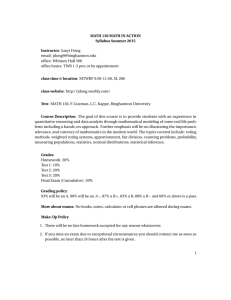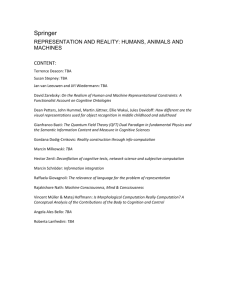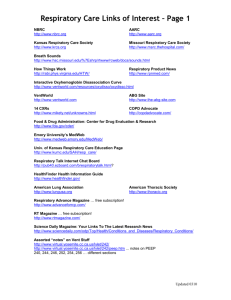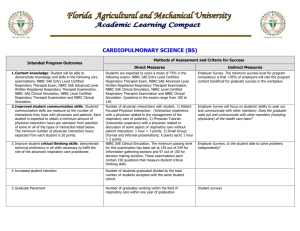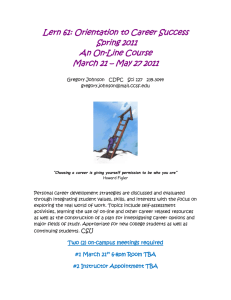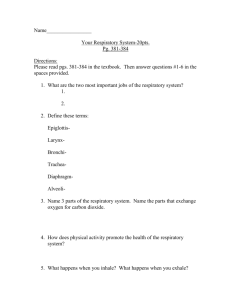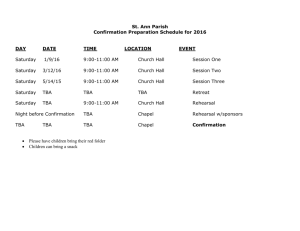CRT Exam and Review - Coahoma Community College
advertisement
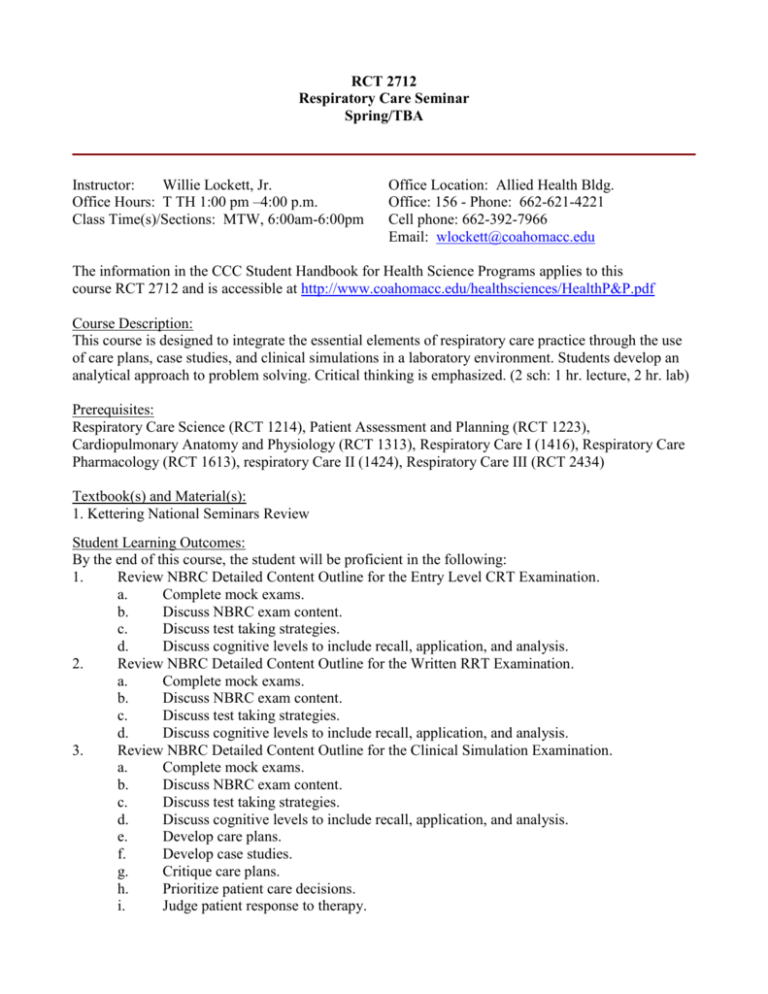
RCT 2712 Respiratory Care Seminar Spring/TBA Instructor: Willie Lockett, Jr. Office Hours: T TH 1:00 pm –4:00 p.m. Class Time(s)/Sections: MTW, 6:00am-6:00pm Office Location: Allied Health Bldg. Office: 156 - Phone: 662-621-4221 Cell phone: 662-392-7966 Email: wlockett@coahomacc.edu The information in the CCC Student Handbook for Health Science Programs applies to this course RCT 2712 and is accessible at http://www.coahomacc.edu/healthsciences/HealthP&P.pdf Course Description: This course is designed to integrate the essential elements of respiratory care practice through the use of care plans, case studies, and clinical simulations in a laboratory environment. Students develop an analytical approach to problem solving. Critical thinking is emphasized. (2 sch: 1 hr. lecture, 2 hr. lab) Prerequisites: Respiratory Care Science (RCT 1214), Patient Assessment and Planning (RCT 1223), Cardiopulmonary Anatomy and Physiology (RCT 1313), Respiratory Care I (1416), Respiratory Care Pharmacology (RCT 1613), respiratory Care II (1424), Respiratory Care III (RCT 2434) Textbook(s) and Material(s): 1. Kettering National Seminars Review Student Learning Outcomes: By the end of this course, the student will be proficient in the following: 1. Review NBRC Detailed Content Outline for the Entry Level CRT Examination. a. Complete mock exams. b. Discuss NBRC exam content. c. Discuss test taking strategies. d. Discuss cognitive levels to include recall, application, and analysis. 2. Review NBRC Detailed Content Outline for the Written RRT Examination. a. Complete mock exams. b. Discuss NBRC exam content. c. Discuss test taking strategies. d. Discuss cognitive levels to include recall, application, and analysis. 3. Review NBRC Detailed Content Outline for the Clinical Simulation Examination. a. Complete mock exams. b. Discuss NBRC exam content. c. Discuss test taking strategies. d. Discuss cognitive levels to include recall, application, and analysis. e. Develop care plans. f. Develop case studies. g. Critique care plans. h. Prioritize patient care decisions. i. Judge patient response to therapy. j. k. l. Modify care plans as needed. Collect appropriate patient data. Analyze patient data. School Attendance: Regular class attendance and punctuality are expected. All arrangements for completing missed work are to be made with the instructor. It is the student’s responsibility to initiate these arrangements. Excessive absences may result in loss of credit for the course concerned as well as loss of grant refunds and/or financial aid eligibility. The nature of the educational programs at Coahoma Community College is such that it is necessary for every student to attend class regularly. Instructors will keep accurate class records, and those records will become part of the student's official record. NOTE: In the event of inclement weather, the President may cancel classes. Students are advised to listen to the TV or radio for an announcement. Absence without an official closure is treated as an unexcused absence unless there is a danger for the student to drive. Respiratory Care Attendance: The student is expected to attend class 100% of the time. In case of an unavoidable absence, the student is required to submit in writing the requested absence. Emergency absence will be handled as follows: Telephone notification must be made to the Instructor one hour prior to the scheduled class time. The student must speak directly to the Instructor, Program Director, Clinical Director, or secretary. Leaving messages is not sufficient notification. Failure to follow these instructions will result in immediate disciplinary action according to school and program policy. TARDIES: A tardy is considered arriving at any time past the designated class time. Proper notification must be made (see attendance policy). If the student is tardy without proper notification, they may be refused entry into class resulting in the student counted absent. ALL ABSENCES AND TARDIES will result in a grade reduction as follows: Three (3) tardies equals 1 absence. Greater than 3 absences will result in a 5 point reduction in the final grade. Absence from Class for School Sanctioned Activities Students who are absent from class due to participation in an officially sanctioned school activity must present notice of the event to the instructor (at least one week prior is desirable) and request advance assignments. If the student is passing the course, the request for make-up will be honored. If missing the class will endanger the student's academic success, the instructor will notify the activity sponsor; the sponsor and the instructor will determine a decision regarding the student’s participation in the activity. In general, the decision will reflect the philosophy that students attend college for educational purposes, and participation in activities outside the classroom is recognized as a lower priority. Blackboard Students are responsible for checking announcements and course postings on the Blackboard course sites. Literature Review Each assigned week (see below), each student will be expected to read one article from a Respiratory Care journal or magazine such as Respiratory Care, Advance, or Times and prepare a written synopsis. A total of 7 papers will be required. 1 additional paper may be submitted for extra credit. The first paper is due by 12:00 a.m. on Friday of the assigned week. A paper will be due biweekly on succeeding Fridays by 12:00 a.m. Late papers will receive credit, but points will be deducted. Papers should be prepared using MS Word and placed in the Blackboard Digital Drop Box on or before the due date. Articles should be current (dated 2005 or later). You may submit papers on articles of your choose only related to respiratory care. Papers should contain the following: o Bibliographic information (title of article, source, date, etc.) o Summary of article o Interpretation/assessment of article o Implications for practice o Each paper should be one to one and a half double-spaced pages in length, and no more than two. o Use the Publication Manual of the American Psychological Association (APA), Fifth Edition format for all writing assignments. See course information for sample Lit. Review format. Make-up Policy: There are no make-up examinations. Depending on the number of test, a maximum of 2 grades may be dropped at the end of the semester. With the approval of the Program Director and/or Vice President of Health Science, with a valid written explanation of absence, Mid-Term and Final Exam can be made-up within 5 days of the date the exam is given. Cheating Policy/Plagiarism: Cheating and Plagiarism will not be tolerated. All offenders will be referred to the counseling and program. Electronic Devices in Class: The use of cellular phones, pagers, CD players, radios, and similar devices is prohibited in the classroom and laboratory facilities. Non-Discrimination/Disability Policy: The Board of Trustees of Coahoma Community College has adopted a policy assuring that no one shall, on the grounds of race, color, national origin, sex, or disability, be excluded from participation in, be denied benefits of, or otherwise be subject to discrimination in any program, activity, or employment of Coahoma Community College. Instructional Techniques: Classroom Lecture Computer Lab Literature Review Method(s) of Evaluation: Students enrolled in this program are required to take a written examination at the end of each nineweek period. During the nine-week intervals, each student will satisfy specific objectives by demonstrating an understanding at the 81% level on oral and written test and/or direct observation. The student's nine-week average will come from quizzes, assignments and class room participation. The final average will be assigned a letter grade according to the grading scale listed below: Professional Characteristics* Literature Review NBRC Online CRT Exam NBRC Online RRT Written Exam NBRC Online CSE Exam 10% 15% 25% 25% 25% *Professional Characteristics includes Attendance, Dress (See Dress Code in Student Program Manuel) and classroom participation. Grading Scale/System: In the Respiratory Care Program the grading system is: A - Excellent 95 - 100 B - Good 88 - 94 C - Average 80 - 87 F - Failure 79 and below NOTE: Students must have a final grade of 80 in each subject (lecture, lab, and clinical) in order to progress in the Respiratory Care Program. This outline is intended as a guideline for the course. The university/college/institution and the instructor reserve the right to make modifications in content, schedule, and requirements as necessary to enhance each student’s educational experience and student learning outcomes. Course Name TENTATIVE SCHEDULE OF CLASS ASSIGNMENTS/TESTS WEEK 1 2 3 4 5 6 7 8 9 10 11 12 13 14 15 16 ASSIGNMENTS/TESTS NBRC CRT, RRT, CSE Matrix Content Review Test Taking Skills Review Mock CRT Exam CRT Exam and Review LIT Review due by Friday Midnight CRT Exam and Review CRT Exam and Review LIT Review due by Friday Midnight CRT Exam and Review CRT Exam and Review LIT Review due by Friday Midnight CRT Exam and Review NBRC Online CRT Exam LIT Review due by Friday Midnight MOCK RRT Written and CSE EXAM Break RRT-Written Exam and Review LIT Review due by Friday Midnight RRT-Written Exam and Review RRT – Written and/or CSE and Review LIT Review due by Friday Midnight RRT – CSE and Review RRT – CSE and Review LIT Review due by Friday Midnight NBRC Online Exam RRT and CSE DATE DUE TBA TBA TBA TBA TBA TBA TBA TBA TBA TBA TBA TBA TBA
